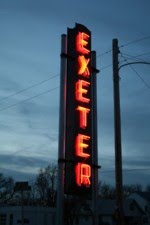What started as a way to entertain guests at a 50th
anniversary party turned into a lifelong passion for Rose Marie Hulse.
When Hulse, a lifelong resident of Fillmore County, began to
plan her parents’ 50th anniversary celebration she realized she
wanted to do something different. After a discussion with her mother she
decided to decorate an area with a family chart starting with each set of her
four great grandparents.
“It drew so much attention. I left scratch paper
nearby for people to make notes or write something if they knew the people on
the wall along with their names and addresses,” explained Hulse.
Following up on the notes the guests left, Hulse caught the
genealogy bug and it hasn’t left her since. From her first initial forays
she was hooked and found a genealogical society in York to join. She was
elected president after a year but realized that her heart wasn’t in the York
club since she and her family were from Saline and Fillmore County.
Next, Hulse heard about the Nebraska State Genealogical
society and became a charter member of the group.
In the late 1970’s Hulse organized a Fillmore County
Genealogical Society, “The response was unbelieveable.”
The group met in Exeter in the basement of the city
office/library until water issues forced them out. Today the group still
meets on a monthly basis at the Geneva library.
Continuing her digging for family and county information,
Hulse began reading the area cemeteries. “I would go and collect the
names, birth and death dates and any other information that was on the
tombstones. I took my Dad with me to help read some of the stones in
Czech and he would tell such great stories about the people he knew.”
Hulse compiled the information and then created directories
for each cemetery in the county except for the Geneva area which other club
members read. Hulse also worked on directories for cemeteries in Saline
and southern York County.
These books caught the attention of the Nebraska Historical
Society who wanted to preserve the information and the Nebraska Genealogical
society who eventually published the records, crediting Hulse for her
work. Hulse took the information a step further and began to save records
of births, deaths, marriages, moving records, prison records, mental
institution information and divorces from local newspapers.
When the Nebraska Historical Society advertised in the late
1970’s that they would be emptying a newspaper storage bunker and giving away
the papers from all over the state that were already microfilmed, Hulse applied
to receive the papers from the area. “They knew that I was reading
cemeteries and donating so much information. I always wanted full dates
of birth and death and who their parents were so I was always going to Lincoln
to the Historical Society and getting the information. To have the papers
here would be wonderful.”
Hulse and a group of volunteers brought two grain trucks
loads of papers back from the storage bunkers in Mead. Some of the papers
dated back into the 1800’s or were single issue or short run papers.
Hulse cataloged and grouped all of the newspapers and has
stored them in her basement since then. She continues to receive the area
papers and adds them to her collection, gleaning the information before storing
them. As her amount of information began to increase, the word got out that she
was a great source for those seeking geneological information.
Hulse began to get calls and letters requesting genealogical
information. Hulse would gather the information, copy it and send it to
the requestor. Almost everyone responded with gratitude and payment for
her time and work. Hulse got letters from as far away as France,
eventually compiling three copy paper boxes of request letters, “I enjoyed looking
things up.”
These days, although still getting requests for information,
Hulse has retired from doing research for others. She continues to go
through the old newspapers, gleaning the information to record for the Fillmore
County Genealogical Society papers as she has time, recording births, deaths,
marriages and divorces cataloging them in her system.
All the records Hulse has kept have been handwritten or
typed. She doesn’t own a computer and doesn’t plan on getting one.
“Computers have ruined genealogy in some ways. People don’t need to come
to meetings anymore. People need to be careful what they find online,
there is a danger in not going to the original source, the courthouse always
has the right information, not the internet.”
Another project Hulse used her genealogical interests on was
the 1988 Milligan Centennial Book. The 640 page purple book covers the
history of the Milligan area along with information on the families who lived
there during the 100 years.
To raise funds to publish the book, Hulse and other
committee members gleaned news from old Milligan newspapers, created a weekly
newsletter and sold them each week. They included something from each
month starting in 1894, noting funny and tragic stories along with births and
deaths recorded.
“I’ve met so many interesting people from all over, it’s
such a fascinating field. I’ve made a lot of good memories,” said Hulse.
To start your own research Hulse recommends that you “start
with yourself. Start with your parents and grandparents and go from
there. Keep the information in a notebook with one page per
marriage. Then the children and their information from that family behind
that page. If you get stuck, obituaries are a great place to find
information.”


No comments:
Post a Comment